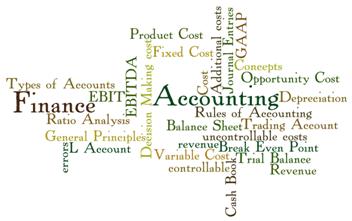

Featured AMCAT Module: Finance and Accounting

1. About the Module
The Finance and Accounting module focuses primarily on the topics of financial and cost accounting as taught in a bachelor’s degree in commerce. The module has been designed for a fresh graduate who may not have any industry experience; therefore, the focus is more on basic fundamental concepts and their application which aren’t industry specific. The module is structured around the areas taught in a bachelor’s degree which are relevant to industrial accounting work. It basically tests the ability of students to understand the increasingly complex and critical area of finance coupled with knowledge of the practices of accounting.
The module covers:
- General Principles of Accounting
- Preparation of final accounts
- Depreciation
- Ratio Analysis
- Cash Book
- Types of Cost and Revenue.
2. Relevance to the Industry
The fundamental knowledge of Finance and Accounting is imperative to pursue a career in the BFSI sector- Banking, Financial Services and Insurance. Banking may include core banking, retail, private, corporate, investment, cards and the like. Financial Services may include stock-broking, payment gateways, mutual funds etc. Insurance covers both life and non-life.
Apart from these, there are positions of accounting in every company, both large and small. These people do day-to-day accounting work at these firms. Also, companies outsource their accounting work to other companies. These organizations perform backend accounting, vendor management, taxing, etc. for their clients. They hire in large numbers candidates with accounting knowledge and the position at which they are hired has a growth path into management positions. Also, there are positions for accounting personnel in chartered accountant firms as well. All in all, there are various positions for accountants in all sorts of companies, banks, accounting outsourcing companies and chartered accountant firms. For all these positions, the accounting module is the primary module to test candidates.
- Clear your basics: Your understanding of basic concepts helps you score better. For example: to work on problems, basic step is to apply the three golden rules of accounting. Again, in questions asking for rectification of errors, you need to know the rules of debit and credit and the types of accounts in order to rectify the entries. To get your basics right:
- Follow standard books of accounting. Some books to refer are: ‘ Principles and Application of Accountancy (Vol.1)’ by A. Basu, ‘Accounting Principles’ by Anthony, R.N. and J.S. Reece, ‘Financial Accounting’ by P.C.Tulsian.
- Know the terms: General Awareness on day-to-day basic financial and accounting terms such as ICAI, GAAP, etc. helps you to apply the concepts well. For example: you must be able to practically understand and distinguish between debit and credit or assets and liabilities, etc.
- Read to understand "WHY": This is a technical subject, it is logical, and it requires reasoning. Scan the entire problem to get an overview of what is involved and what is expected. For example: approaching questions with a thought as to why a trial balance may not tally. Understanding ‘why of something’ would involve having the concepts of errors involved in trial balance to be clear. Then applying higher concepts of correcting those errors will be easier.
- Visualize a transaction: The best way to improve your accounting knowledge is to visualize. When you do so, you get a better understanding of what the question or situation demands from you. For example: if there is a question which says a man started a business with capital of one lakh, imagine a man who has Rs 1 lakh in his hand. If it says he utilizes this money in buying machinery, visualize him doing so. This would give you a better understanding of what the question says and you would surely be in a better position to answer the question. Once you understand the question well, a major part of the problem is solved.
- Work problems to understand "HOW"
- Follow a systematic procedure to solve the problems. For instance, in journalizing-one should start with thinking which accounts are involved, where they fall in a fundamental accounting equation, which account is increased or decreased. Following such steps would help to solve the problems easily and would help in improving problem solving skills.
- Break down the problem into manageable chunks. Write down the sub-problems. Such kind of approach helps to solve final accounts. For instance in preparing the P&L account, you need to take the balance of gross profit/loss from the trading account. Thus the overall problem has to be divided into 2 parts-first working on trading account and then on P&L account
- Change your approach if your solution doesn’t work. There are more than one ways to solve a problem. For instance, sometimes solving the questions using backward reasoning leads to the final answer. This kind of strategy is used in solving cost accounting problems. Example in cases where operating profit is given you may work backwards in order to arrive at gross margin.
- Myths to Avoid:
- If you like numbers or counting, you will do extremely well in accounting.
Truth is: Accounting only involves simple additions, subtractions, divisions, multiplication and a few formulae. The catch is getting the right numbers to carry out the calculation. - Learning accounting is like learning the rules of a game. Students assume that the only thing that really matters, is memorizing the appropriate list of rules involved in calculating, say, LIFO versus FIFO cost of goods sold.
Truth is: Learning accounting is like learning a new language. One should learn how to communicate financial information to interested parties in an effective way.
- If you like numbers or counting, you will do extremely well in accounting.




